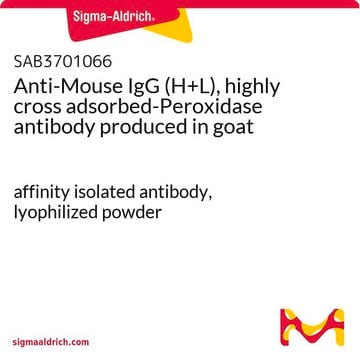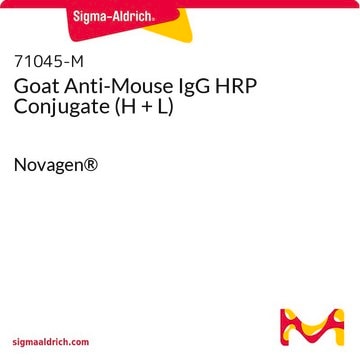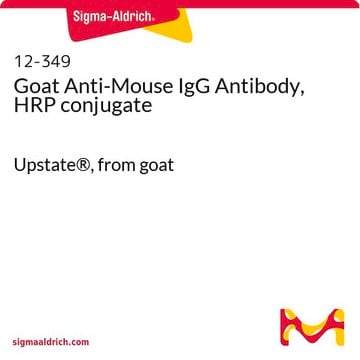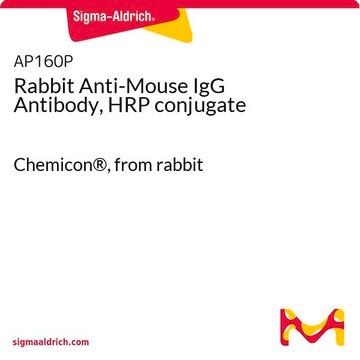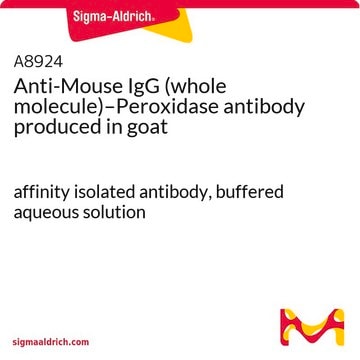SAB3700993
Anti-Mouse IgG F(ab′)2-Peroxidase antibody produced in goat
affinity isolated antibody, lyophilized powder
Synonym(s):
HRP
Sign Into View Organizational & Contract Pricing
All Photos(1)
About This Item
UNSPSC Code:
12352203
NACRES:
NA.46
Recommended Products
biological source
goat
Quality Level
conjugate
peroxidase conjugate
antibody form
affinity isolated antibody
antibody product type
secondary antibodies
clone
polyclonal
form
lyophilized powder
species reactivity
mouse
technique(s)
immunohistochemistry: suitable
indirect ELISA: suitable
western blot: suitable
shipped in
wet ice
storage temp.
2-8°C
target post-translational modification
unmodified
Related Categories
General description
Immunoglobulin G (IgG) belongs to the immunoglobulin family and is a widely expressed serum antibody. It consists of a γ heavy chain in the constant (C) region. The monomeric 150kDa structure of IgG constitutes two identical heavy chains and two identical light chains with molecular weight of 50kDa and 25kDa respectively. The primary structure of this antibody also contains disulfide bonds involved in linking the two heavy chains, linking the heavy and light chains and resides inside the chains. IgG is further subdivided into four classes namely, IgG1, IgG2, IgG3, and IgG4 with different heavy chains, named γ1, γ2, γ3, and γ4, respectively. Limited digestion using papain cleaves the antibody into three fragments, two of which are identical and contain the antigen-binding activity. They are known as fragment antigen binding (Fab) fragments. These fragments contain the light chains paired with the VH and CH1 domains of the heavy chains. Pepsin cleaves the carboxy-terminal side of the disulfide bonds in the general region of the antibody and this gives rise to the F(ab′)2 fragment. The two antigen-binding arms of the antibody are linked in this fragment. Maternal IgG is the only antibody transported across the placenta to the fetus. It passively immunizes the infants.
Specificity
This product was prepared from monospecific antiserum by immunoaffinity chromatography using Mouse IgG coupled to agarose beads followed by solid phase adsorption(s) to remove any unwanted reactivities. Assay by immunoelectrophoresis resulted in a single precipitin arc against Anti-Peroxidase, Anti-Goat Serum, Mouse IgG, Mouse IgG F(ab′)2 and Mouse Serum. No reaction was observed against Mouse IgG F(c).
Immunogen
Mouse IgG F(ab′)2 fragment
Application
Applications in which this antibody has been used successfully, and the associated peer-reviewed papers, are given below.
Western Blotting (1 paper)
Western Blotting (1 paper)
Physical properties
Antibody format: IgG
Physical form
Supplied in 0.02 M Potassium Phosphate, 0.15 M Sodium Chloride, pH 7.2 with 10 mg/mL Bovine Serum Albumin (BSA) - Immunoglobulin and Protease free
Reconstitution
Reconstitute with 1.0 mL deionized water (or equivalent).
Disclaimer
Unless otherwise stated in our catalog or other company documentation accompanying the product(s), our products are intended for research use only and are not to be used for any other purpose, which includes but is not limited to, unauthorized commercial uses, in vitro diagnostic uses, ex vivo or in vivo therapeutic uses or any type of consumption or application to humans or animals.
Not finding the right product?
Try our Product Selector Tool.
Certificates of Analysis (COA)
Search for Certificates of Analysis (COA) by entering the products Lot/Batch Number. Lot and Batch Numbers can be found on a product’s label following the words ‘Lot’ or ‘Batch’.
Already Own This Product?
Find documentation for the products that you have recently purchased in the Document Library.
Steven Molinarolo et al.
The Journal of biological chemistry, 293(14), 4981-4992 (2018-01-27)
Voltage-gated, sodium ion-selective channels (NaV) generate electrical signals contributing to the upstroke of the action potential in animals. NaVs are also found in bacteria and are members of a larger family of tetrameric voltage-gated channels that includes CaVs, KVs, and
Kevin R Francis et al.
Nature medicine, 22(4), 388-396 (2016-03-22)
Smith-Lemli-Opitz syndrome (SLOS) is a malformation disorder caused by mutations in DHCR7, which impair the reduction of 7-dehydrocholesterol (7DHC) to cholesterol. SLOS results in cognitive impairment, behavioral abnormalities and nervous system defects, though neither affected cell types nor impaired signaling
Human placental Fc receptors and the transmission of antibodies from mother to fetus.
Simister NE and Story CM
Journal of Reproductive Immunology (1997)
Antibody structure, instability, and formulation.
Wang W
Journal of Pharmaceutical Sciences (2007)
Our team of scientists has experience in all areas of research including Life Science, Material Science, Chemical Synthesis, Chromatography, Analytical and many others.
Contact Technical Service

